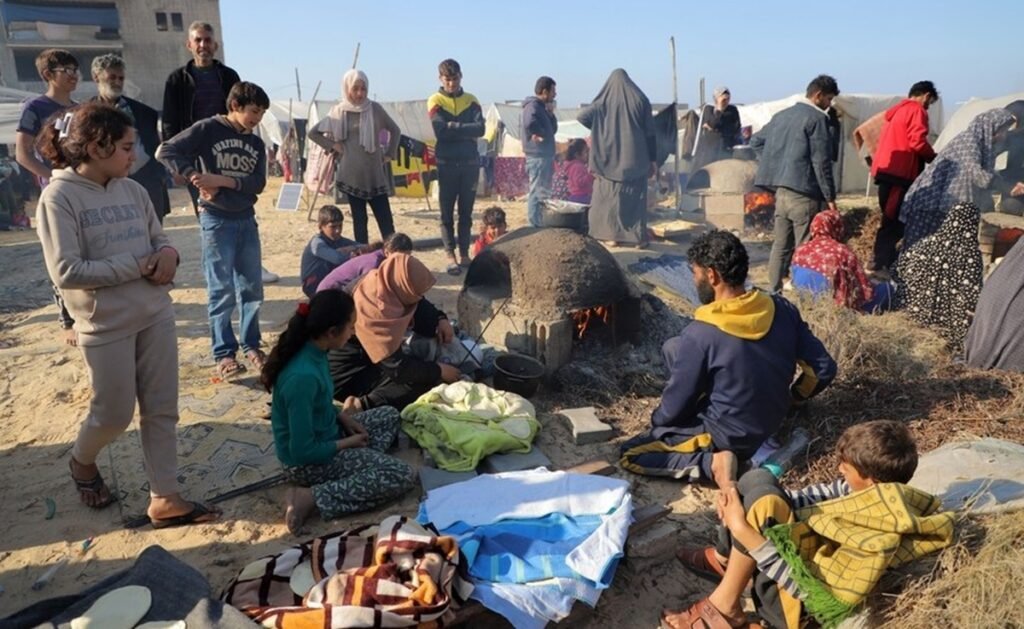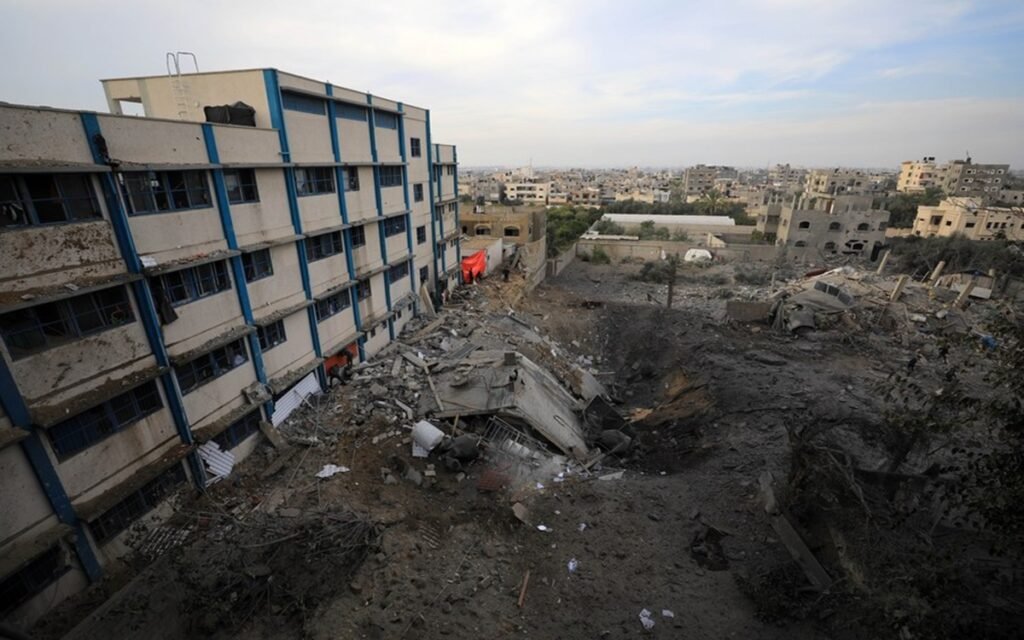GAZA — Over 20,000 deaths in Gaza, and a ceasefire remains elusive. This is so far the heaviest loss on the Palestinian and Arab sides in any conflict with Israel since 1982.
War-torn Gaza is battling failed services and desperately trying to access critical supplies. Alarmingly, out of 36 hospitals, only nine are operational, with just four providing essential emergency care, according to WHO Regional Director for the Eastern Mediterranean Ahmed Al-Mandhari.
Outcry grows in the Arab world as united action falls short amid sabotage by certain parties, and the tragic loss of life is left evolving daily into a grave, persistent humanitarian disaster.
Mounting outcry
In a recent interview with Xinhua, political affairs journalist Hala Suleiman voiced grave concern over the extensive devastation inflicted by the Israeli offensive in the Gaza Strip.
Despite extensive international appeals for an instant ceasefire, Israel persists in its unrelenting assault, blatantly disregarding all international laws by targeting hospitals, mosques, churches, and even schools, Suleiman said.
Raed Mahmoud, a political editor with the Jordan Press Foundation, said Israel continues with its crimes and is also impeding the delivery of critical humanitarian aid to the civilians.

Displaced Palestinians prepare food at a temporary shelter in the southern Gaza Strip city of Rafah, on Dec. 18, 2023. (Photo by Rizek Abdeljawad/Xinhua)
Military experts have denounced the shocking toll of the conflict in Gaza, warning that the objectives of the Israeli offensive extend beyond official declarations.
Speaking to the Egyptian newspaper Al-Youm Al-Sabea, Major General Nasr Salem said the conflict was developing along a trajectory toward a “genocidal war against the Palestinian people.”
Marc Garlasco, U.S. military advisor and former intelligence analyst at the Pentagon, characterized the situation in Gaza exceeding anything witnessed in his professional career.
The pace of killings is accelerating, with women and children bearing the brunt, he said.
At a press conference in Cairo, Egyptian Foreign Minister Sameh Shoukry called for an assessment of the massive destruction in Gaza, deeming the conditions unacceptable.
“The Accomplice”
Earlier this month, UN Secretary-General Antonio Guterres urged the Security Council to act to avert a humanitarian catastrophe in Gaza and reiterated his appeal for a ceasefire.
“We are facing a severe risk of collapse of the humanitarian system,” he said, warning that the consequences may have irreversible implications for Palestinians and the peace and security of the entire region.
However, war flames are still raging despite intensified international mediation efforts.
On Friday, the UN Security Council passed a resolution emphasizing the immediate acceleration of aid deliveries to the distressed civilians in Gaza, but without the original call for an “urgent suspension of hostilities” between Israel and Hamas.
The latest vote on the resolution, which the United States abstained, came after four postponements, driven by hopes of averting a U.S. veto.
The United States, Israel’s key ally, has wielded its veto power at the UN multiple times in the wake of the recent Israeli-Palestinian conflict, stonewalling ceasefire resolutions in the pipeline.
“The United States shows little concern for breaking any proposed resolution, even if it stands against blatant injustice, explicit occupation, or contradicts UN decisions,” said Hamad Al-Majid in Arabic newspaper Asharq Al-Awsat.

This photo taken on Dec. 20, 2023 shows the rubble after an Israeli airstrike in the southern Gaza Strip city of Rafah. (Photo by Yasser Qudih/Xinhua)
“All of these considerations seem to hold no weight as long as the resolution is perceived to be against Israel,” the Saudi columnist said.
Speaking via videoconference at the Russian-Arab Cooperation Forum in Marrakesh, Morocco, Arab League Secretary-General Ahmed Aboul-Gheit said, “Anyone who opposes an immediate ceasefire in Gaza has the blood of innocents on their hands.”
The United States has shifted from being an ally to a partner in this conflict — a comprehensive partner that diplomatically and politically covers Israel, standing before international institutions and isolating Israel’s opponents in the region, said Palestinian political writer Akram Atallah.
James Zogby, the founder and president of the Arab American Institute, said that instead of earnestly addressing the significant loss of Palestinian lives and the extremely harsh conditions that survivors are forced to endure, Washington continues to prioritize the fanciful Israeli military objective of “eliminating Hamas.”
The world and a substantial portion of the American public opinion are weary of the U.S. support for Israel’s military campaigns, Zogby said.
Double standards
The West has assumed a distinctly biased role in favor of Israel, breeding disinformation and dehumanization, Sahar Khamis, a nonresident senior fellow at Qatar-based Middle East Council on Global Affairs.
“While the Western media has roundly framed Oct. 7 as a ‘terrorist attack,’ they have portrayed the corresponding Israeli assault on Gaza … as an act of ‘self-defense.'”
Meanwhile, the U.S. media’s tendency to downplay or outright deny Israeli crimes against Palestinians signals to Israel that it can continue its killing spree with impunity and reassures the U.S. administration that it won’t be held to account for its complicity, Rami G Khouri, distinguished fellow at the American University of Beirut, said in an opinion piece carried by Al Jazeera.
Over 750 journalists have signed an open letter published in November, which includes signatories from Reuters, the Los Angeles Times, the Boston Globe and The Washington Post, slamming Western media’s coverage of the conflict, The Washington Post reported.
In the past few weeks, the U.S.-based research organization Arab Barometer conducted a public opinion survey in Tunisia in the past 20 days before and after the Israeli-Palestinian conflict on Oct. 7. Data showed a significant shift in the respondents’ perceptions towards the United States.
Before Oct. 7, 40 percent of Tunisians had “positive” or “somewhat positive” opinions of the United States, compared to 56 percent who held “negative” views. However, by the end of the study period, only 10 percent of Tunisians had “positive” opinions of the United States compared to a 87-percent “negative.”
Senior politicians in the Arab world appear to share that perception with Tunisians. In the daily Al-Ahram newspaper, Egyptian senator Khaled Kandil pointed out the pronounced contradiction between American and European rhetoric on democracy, human rights, and adherence to international law.
In an opinion piece, he observes, “Simultaneously, one encounters headlines proclaiming, ‘America pledges additional humanitarian aid for the Palestinian people,’ while, paradoxically, ‘The ongoing American airlift, initiated on the second day of the conflict, persists in providing military support to the Israeli army.'”
The United States should refrain from providing any weapons or assistance that could be used in the bombing or attacking of Palestinian civilians, Kenneth Roth, executive director of Human Rights Watch, told Al Jazeera, noting that Washington is the largest supplier of weapons and military aid to Israel.
At the very least, he argued, the US should formally link any weapons or aid to a cessation of these attacks. — Xinhua
__________
Cover photo: Children are pictured in building ruins after an Israeli airstrike in the southern Gaza Strip city of Khan Younis, on Dec. 23, 2023. — Xinhua

